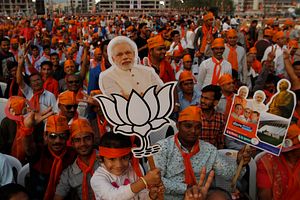The last month of 2017 could possibly herald new beginnings for 2018 in India. The state of Gujarat in western India – where the country’s Prime Minister Narendra Modi was previously elected chief minister twice, from 2001 to 2014 – is observing its assembly elections this week. There is a lot riding on the three voting days (the results will be declared on December 18). The results will matter deeply for the ruling Bharatiya Janata Party (BJP) as well as for the image of Modi, who has been rather loud about the “Gujarat development model” that he championed as chief minister.
That model of rapid growth was thanks to Modi’s neoliberal policies, which focused on improved infrastructure, business-friendly governance, and incentives to the corporate sector to attract investments. However, that isn’t the complete picture of Gujarat, which Modi used as the bait in his campaign in 2014 toward becoming the country’s prime minister. There are several accounts of lowered government funds for education, health, environment, and employment.
The Godhra riots of 2002 – which killed nearly 2,000 people, a majority of whom were Muslims, and propelled Modi as the poster boy of the nationalist ideology of Hindutva – do not seem to be a Achilles’ heel that could steer the election results.
However, what seemed to have been a sure shot win for the BJP has been challenged on account of this idea of “vikas” – development – which Modi and BJP have long leaned on and bragged about in a rather expansive manner. Three young men, with their ears to the ground and representing three distinct populations within Gujarat, have emerged as a collective voice of reckoning and have shaken the confidence of the BJP.
Back in 2015, the now-24-year-old Hardik Patel steered a massive protest seeking reservations for Gujarat’s Patel community. The large crowds at his rallies had worried the BJP, and Patel was not surprised when he faced a smear campaign, with sex tapes being leaked ahead of the polls.
Another challenger is 41-year-old Alpesh Thakor, who is leading the OSS (Other Backward Classes, Scheduled Castes and Scheduled Tribes) in the state and who is wary of the reservation flag raised by Patel. Thakor has been strategic in questioning the state of overall development in Gujarat. “Let a comprehensive survey be carried out to determine the economic status of the upper castes,” he has said. “Let them get their due. Why should we oppose it?” Thakor subsequently joined the Congress, India’s opposition party, officially.
The third thorn for the BJP is 36-year-old lawyer Jignesh Mevani, who raised the torch for Dalits to fight back in mid-2016, when four Dalits were publicly stripped and flogged in southwest Gujarat. He has been continuously addressing the issues faced by Dalits in India and Gujarat, highlighting that most of them don’t control the land for which they have deeds, and that they continue to face humiliation every day with little recourse.
Also in the fray, attempting to make her voice heard with disenchantment toward the BJP, is teacher-turned-activist Chandrika Solanki, who hurled bangles at Modi’s cavalcade to protest the exploitation of contractual labor of the Accredited Social Health Activist workers in the state.
The Patidars account for over 16 percent of Gujarat’s population and most of them have traditionally supported the BJP. The OSS account for at least 40 percent. While it may seem that the election would be drawn on caste lines, what is crucial is that the idea of development – or the lack of a tangible and equitable one – is what has brought the three men and their arguments together, with a potential shot at bringing down the BJP in the state.
Even as two more days of election are forthcoming this week, it is widely expected that allegations will run wild in the attempt to salvage every last vote for one’s party. On the first day of the election on December 9, for example, the Congress alleged that the electronic voting machines (EVM) had been tampered with using Bluetooth. With 89 seats in the state assembly being contested by 977 candidates, what happens in Gujarat will be a decisive factor in the BJP’s path ahead.

































